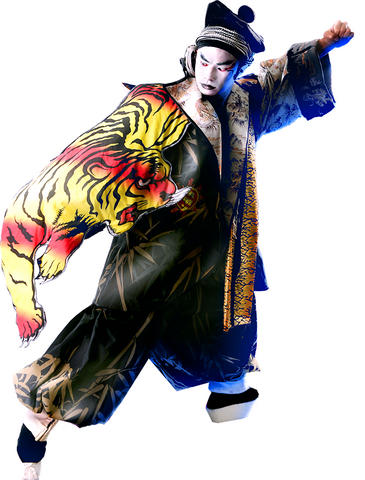Much was expected of the world premiere of 108 Heroes: Tales From Water Margin (水滸108), which opened at the Metropolitan Hall Friday night.
It was going to set the mold for a new kind of contemporary Chinese opera with its bold mixture of tradition and contemporary attitude. Music would range from Beijing opera arias, Mando-pop anthems and even make a short digression into tango. Costumes mixed opera designs with goth, punk, taike (台客) and hip hop. The language would span centuries, with poetry, vernacular storytelling and the most contemporary of modern slang. It had all the potential to be an unmitigated disaster, a hodgepodge that pandered to everyone and pleased no one: But it wasn't. Rough at the edges it was indeed, but so full of vitality and innovation that one could not but overlook most of the flaws and simply applaud the vision and the boldness that brought it to the stage.
Wu Hsing-kuo (吳興國) had set out to make Chinese opera sexy, and with a strong cast of aspiring performers, he pulls off a remarkable coup. With a story like Water Margin (see Taipei Times Friday Oct. 5 for the background), it is no surprise that there are plenty of martial sequences, and this gives the young cast a chance to show off their physical prowess. With fight choreography that draws inspiration from John Woo's (吳宇森) aesthetics of violence and the action of the Street Fighter series of video games, there is plenty there to hold the eye, but Wu manages to insert some fine operatic arias as well.

PHOTO: COURTESY OF CONTEMPORARY LEGEND THEATER
What has been created is unashamed spectacle; great entertainment that manages to avoid triviality by having a script by Chang Ta-chun (張大春), who wrote some gorgeous lyrical passages and manages most of the transitions between traditional and contemporary language with a light touch. For foreign audiences, the presence of English subtitles is a mixed blessing, as they have something of the uneven quality that made Hong Kong B-movies so unintentionally amusing. But with so much going on on-stage, it is hard to take your eye off the action to focus for long on the text.
While all the cast are good, Lin Chao-hsu (林朝緒), who specializes in clown roles, is notable. He shows himself a master of physical theater, and though drawing on the foundation of opera training, clearly has a much wider range. His performance as a midget is astonishing purely for its physical demands, and he can be watched from beginning to end with pleasure without reference to the dramatic action. Chien Yu-shan (錢宇珊) gives taimei (台妹) a new dimension with her body paint and kimono-esque outfits. Some wardrobe malfunctions remain to be ironed out, but the occasional unintended loss of wig or tripping over the voluminous robes while performing some stunning acrobatic feat hardly registered as the audience cheered the audacity of the performers, who were never once disconcerted by these small mishaps.
This is definitely something that anyone with interest in Taiwanese theater, whether traditional or contemporary, should make an effort to see. Although the short three-day run finished yesterday, the show will be staged on Dec. 28 at Hsinchu's National Chiao Tung University (國立交通大學). Given the positive reception the premiere received, it is likely to go on tour in the not-too-distant future.

When the South Vietnamese capital of Saigon fell to the North Vietnamese forces 50 years ago this week, it prompted a mass exodus of some 2 million people — hundreds of thousands fleeing perilously on small boats across open water to escape the communist regime. Many ultimately settled in Southern California’s Orange County in an area now known as “Little Saigon,” not far from Marine Corps Base Camp Pendleton, where the first refugees were airlifted upon reaching the US. The diaspora now also has significant populations in Virginia, Texas and Washington state, as well as in countries including France and Australia.

On April 17, Chinese Nationalist Party (KMT) Chairman Eric Chu (朱立倫) launched a bold campaign to revive and revitalize the KMT base by calling for an impromptu rally at the Taipei prosecutor’s offices to protest recent arrests of KMT recall campaigners over allegations of forgery and fraud involving signatures of dead voters. The protest had no time to apply for permits and was illegal, but that played into the sense of opposition grievance at alleged weaponization of the judiciary by the Democratic Progressive Party (DPP) to “annihilate” the opposition parties. Blamed for faltering recall campaigns and faced with a KMT chair

Article 2 of the Additional Articles of the Constitution of the Republic of China (中華民國憲法增修條文) stipulates that upon a vote of no confidence in the premier, the president can dissolve the legislature within 10 days. If the legislature is dissolved, a new legislative election must be held within 60 days, and the legislators’ terms will then be reckoned from that election. Two weeks ago Taipei Mayor Chiang Wan-an (蔣萬安) of the Chinese Nationalist Party (KMT) proposed that the legislature hold a vote of no confidence in the premier and dare the president to dissolve the legislature. The legislature is currently controlled

As we live longer, our risk of cognitive impairment is increasing. How can we delay the onset of symptoms? Do we have to give up every indulgence or can small changes make a difference? We asked neurologists for tips on how to keep our brains healthy for life. TAKE CARE OF YOUR HEALTH “All of the sensible things that apply to bodily health apply to brain health,” says Suzanne O’Sullivan, a consultant in neurology at the National Hospital for Neurology and Neurosurgery in London, and the author of The Age of Diagnosis. “When you’re 20, you can get away with absolute